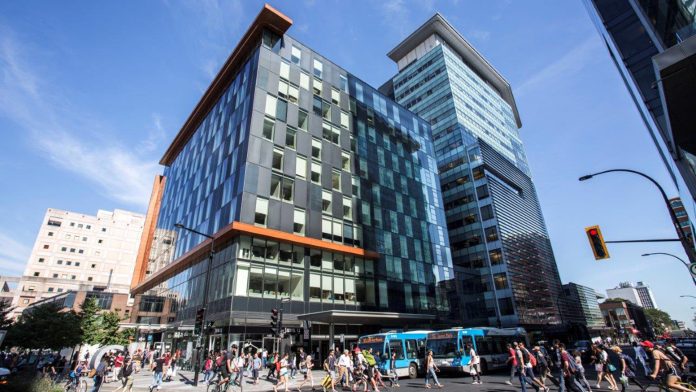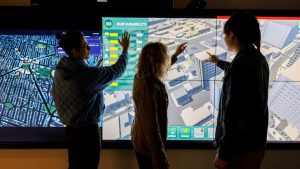The Innovation Platform spoke with Effrosyni Diamantoudi, Dean of Graduate Studies at the University, to discuss Concordia’s unique contributions to Montreal’s academic landscape and the forward-thinking initiatives that tackle real-world challenges.
Montreal is widely regarded as one of the world’s top university cities, offering a vibrant and diverse educational landscape that welcomes students from across the globe. Among the prominent institutions contributing to this dynamic environment is Concordia University. Although relatively young, Concordia is rapidly making a name for itself in research and graduate studies.
What sets Concordia apart is its innovative approach to education. The university fosters a spirit of creativity and collaboration, creating an inclusive atmosphere where students and researchers can thrive. The Innovation Platform spoke with Effrosyni Diamantoudi, Dean of Graduate Studies at the University to discuss Concordia’s unique contributions to Montreal’s academic landscape, emphasising its commitment to interdisciplinary learning, substantial research funding, and forward-thinking initiatives that tackle real-world challenges.
Montreal is often ranked among the world’s top university cities. How does Concordia fit into Montreal’s academic landscape?
Montreal is a charming city that has a unique ability to welcome newcomers. I first arrived here in the 1990s as an international student and never left; the city truly embraced me. This experience is common in Montreal, where the rich multicultural environment creates a sense of belonging for its residents.
Additionally, Montreal is an affordable and safe city, making it an excellent choice for students seeking to advance their education and researchers looking to develop their careers. The city provides a lively atmosphere where one can enjoy life and connect with people from around the globe. With a significant concentration of universities, Montreal serves as a bustling hub for education and research.
Numerous centres and institutes across various universities promote collaboration, establishing the city as a remarkable centre for innovation. Furthermore, as a major urban centre, Montreal is filled with industries and NGOs, offering countless opportunities for partnerships with non-academic entities.
What makes Concordia stand out when it comes to research and graduate studies?
Concordia University is a relatively young institution, having recently celebrated its 50th anniversary. Being a younger university provides us with unique advantages; we are not bound by traditional academic practices, which allows us to be forward-looking, agile, and highly adaptable in our approach to education, research, and experiential learning. For instance, the university’s District 3 Innovation Hub offers students and researchers an incubator environment to develop entrepreneurial skills and work on real-world projects, a departure from the more theory-heavy focus of traditional academic scenes.
Our dedicated School of Health plays a significant role in shaping our academic landscape, offering innovative programmes that emphasise the importance of health and wellness in society. In addition, we boast a variety of interdisciplinary programmes within our School of Graduate Studies, such as the Individualized Program (INDI) Graduate Studies, which allows students to create customised degrees that transcend traditional academic boundaries. Interdisciplinary focus enables our students and researchers to tackle complex real-world challenges from multiple perspectives, fostering creativity and innovation along the way.
At Concordia, we hold research in high regard, and this is clearly demonstrated through the substantial funding we allocate to support our graduate students and researchers. Our financial commitments ensure that our students have access to the resources they need to pursue groundbreaking research initiatives. Our commitment is reflected not just in words but in actions. We actively support a wide array of initiatives, such as the AI Institute, fostering collaborative research initiatives that address pressing issues and advance our understanding in various domains.
By cultivating an academic landscape that encourages exploration and creativity, Concordia University continues to push the boundaries of traditional education and research, preparing our students to be innovative leaders in their fields. A great example of this is Milieux Institute, a transdisciplinary research hub that fosters creativity and exploration at the intersection of arts, culture, and technology.
How do Concordia’s foundation for research excellence contribute to securing a major investment in electrification research from the government of Canada?
Volt-Age is an innovative initiative designed to advance society’s electrification in a sustainable and inclusive manner. Last year, the federal government provided $123m in funding to establish the programme and support its objectives.
The programme has made significant progress in its early stages, notably by launching a recruitment drive for 250 new PhD students who will contribute to various research areas within Volt-Age. This influx of new talent is a promising development for the initiative, as these students will bring fresh perspectives and innovative ideas to the table.
In pursuit of its mission, Volt-Age has forged several strategic partnerships with diverse organisations and stakeholders such as tech startups, legal experts, industry leaders like Hydro-Québec, government agencies, non-profits and international research networks. The initiative encompasses a broad range of electrification aspects, including the crucial technical components of developing advanced batteries and solar panels.
Moreover, Volt-Age is committed to community engagement and collaboration. We are actively working with Indigenous communities, recognising their invaluable knowledge and sustainable practices related to land and energy resources. Additionally, we are partnering with the Climate Change Group and other key organisations to promote the transition to clean energy sources and address the challenges posed by climate change.
It is truly inspiring to witness the collaboration among such a variety of disciplines – engineering, environmental science, community leadership, and public policy – coming together to work towards this larger, unifying project. This synergy not only enhances the effectiveness of our efforts but also fosters a shared vision for a more electrified and sustainable future.
How does Volt-Age contribute to Concordia’s research strengths?
Volt-Age contributes in four major ways: attracting new students, hiring talented faculty, improving our infrastructure, and providing critical funding for our researchers. This funding enables existing researchers to pursue innovative projects and expand their work, ultimately enhancing the academic landscape of our institution.
Through Volt-Age, we are successfully expanding our graduate and post-doctoral recruitment efforts, reaching out to more people, and bringing in a wider variety of students who might not have considered joining us before. This added diversity will foster a more inclusive academic environment and enrich the overall learning experience.
At the same time, we are enhancing our infrastructure significantly. This includes upgrading existing facilities and investing in new technologies to create a more conducive atmosphere for learning and research. These improvements are essential for accommodating our growing student body and facilitating advanced research programmes.
Furthermore, an important aspect of our development through Volt-Age is the recruitment of highly qualified faculty members. By hiring experienced educators and researchers, we are strengthening our academic programmes and ensuring that our students receive top-notch instruction and mentorship.
Concordia is actively recruiting PhD students worldwide to join Volt-Age. What makes this opportunity appealing, and why should they consider applying?
This programme is a generous opportunity for students, providing a substantial stipend of $35,000 per year for four years. This financial assistance is crucial for graduate students as they embark on their academic journeys, allowing them to focus on their studies.
However, the benefits extend beyond mere financial support. Students who participate in this programme will become integral members of a vibrant and expansive community of researchers dedicated to a significant and impactful project. This collaborative environment fosters meaningful connections and friendships, creating a robust support network that students can rely on both during their studies and long after they graduate.
In addition to the foundational financial backing, Volt-Age enhances the student experience by offering a variety of additional resources. Among these are specialised workshops designed to develop skills in entrepreneurship and professional development, uniquely tailored for Volt-Age programme participants. These workshops aim to empower students to refine their research agendas and cultivate their overall career trajectories in academia and beyond.
Furthermore, students will have the invaluable opportunity to engage with a diverse range of non-university partners with whom Volt-Age collaborates. This exposure will not only broaden their professional network but also provide them with insights into different industries and potential career paths, setting them up for success in their future endeavours. Overall, this opportunity is designed to equip students with the tools they need to thrive both academically and professionally.
Please note, this article will also appear in the 20th edition of our quarterly publication.






